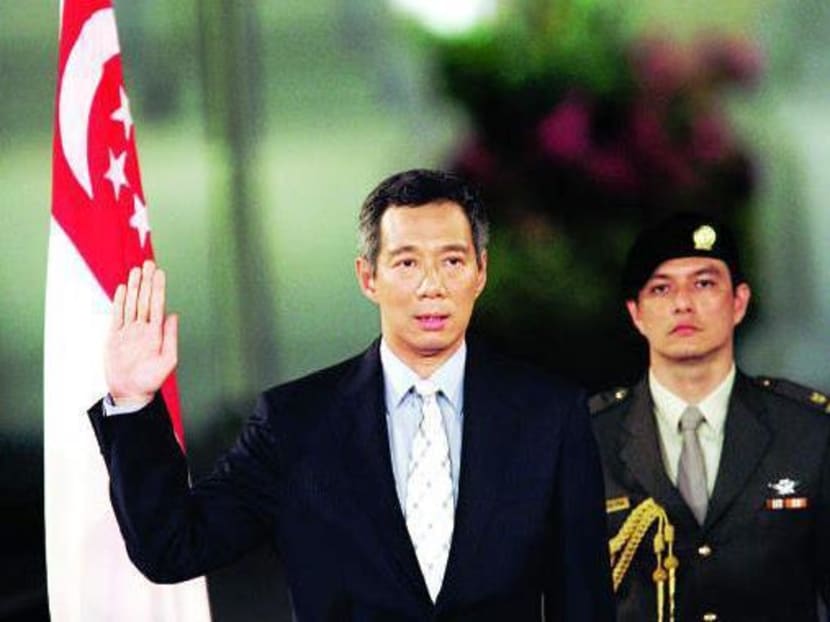Govt 'has drawn lessons from planning inadequacy'
SINGAPORE — For a Government known for its foresight, the fact that it did not build up its infrastructure quickly enough in anticipation of a population growth driven mainly by an influx of foreign workers still gnaws on Prime Minister Lee Hsien Loong, who cited this as a regret in his 10 years or so leading the country. But lessons have been learnt: In future, policymakers have to be prepared for a wide range of outcomes and “insure ourselves”, he said.

Prime Minister Lee Hsien Loong's inaugural address to the nation as PM at the Istana in 2004. TODAY file photo
SINGAPORE — For a Government known for its foresight, the fact that it did not build up its infrastructure quickly enough in anticipation of a population growth driven mainly by an influx of foreign workers still gnaws on Prime Minister Lee Hsien Loong, who cited this as a regret in his 10 years or so leading the country. But lessons have been learnt: In future, policymakers have to be prepared for a wide range of outcomes and “insure ourselves”, he said.
“We have to plan in future less conservatively and try to be less precise in our prognostications,” said Mr Lee, adding that the external environment has a huge bearing – apart from government policies - on how the country shapes up in the next decade.
It is precisely with this approach that the Government put up the Population White Paper last year, with a 6.9 million population planning parameter for 2030 which was, however, misunderstood by the public as a target. “We do not want 6.9 million as a target but I want to have infrastructure… I want to get myself ready. If unexpected things happen, I can be prepared,” Mr Lee said. “That is the attitude which the Government needs even more, and so does the population. And when things turn out not quite right, well, we accept that that is the way the world is.”
Nevertheless, he could understand the public’s “strong emotional reaction” to the White Paper. On hindsight, the Government could have done better in communicating the White Paper if it had “a bit more time to prepare the ground - to explain it, to soft-sell, and prepare people to understand what is the issue”, he said.
In 2013, Mr Lee first admitted that the Government did not have 20/20 foresight, resulting in the problem of inadequate infrastructure. He brought up the issue again, when he was asked if he has any regret during his tenure as Prime Minister. “At the time we thought we were doing the right thing - pacing it, measuring it out, building it when we needed it and not spending resources until we needed to spend them,” he said. “It turned out that things did not pan out the way we expected.”
The Government has since taken steps to rectify the situation, ramping up public housing, tightening the inflow of migrant workers and improving public transportation.
On what he was most satisfied with, Mr Lee cited the continued emphasis on education, with a slew of far-reaching initiatives rolled out over the years. “Right from the beginning, at my first National Day Rally, one of my themes was on the young. We were talking about schools - Teach Less, Learn More and getting people to get the maximum out of their education,” he recounted.
Acknowledging the work of “successive capable, strong Education Ministers supported by competent and passionate professionals”, Mr Lee added: “We have followed through on that in many ways.” He cited the Government’s investments in schools, Edusave and building up the Institutes of Technical Education, among other initiatives. The polytechnic and university sectors have also been enhanced, with more university places being created for Singaporeans. Beyond formal education, there are also opportunities to develop skills relevant to the future and pursue lifelong learning.
Addressing criticism that the education system heaps too much pressure on students and parents, Mr Lee said: “If parents were unconcerned about their children’s education… we would have another set of problems… But we also would like people to have a holistic education. It is not just grades.”
The Ministry of Education has sought to re-emphasise character education in recent years, to reduce the fixation on academic grades. Mr Lee said: “Collectively, we put too much emphasis on tuition. We think that if we hothouse our children, it will make all the difference. I am not so sure.”
He added: “I can understand the concerns of the parents who want to give their children the best but we also want to give the children the time and the space to grow up. Have a certain steady attitude towards how the children are doing in school. If you get the top marks, that is good. If you did not quite get the top marks, it is not the end of the world. If you get into the school you prefer, well, congratulations; if you did not… keep on trying your best.”
Looking back on a decade as Prime Minister, Mr Lee said an important personal lesson is the need for the country – from the public, right through the Civil Service, ministries and the Cabinet - to work together. More than ever, the Prime Minister needs to depend on a strong team, he added. “That has been much more so than I expected. I would say for my successor, it would be even more so because the problems will be even more complex.”








